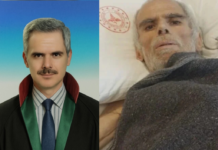The wife of an imprisoned former teacher in a letter to Peoples’ Democratic Party (HDP) deputy Ömer Faruk Gergerlioğlu said her husband suffered from chronic heart disease and called on the authorities to release him from prison.
Sevilay Üneş said her husband, Ünal Üneş, 65, had a stent implanted while he was in prison and also suffers from advanced diabetes. Despite his health problems, Üneş has been kept in a one-person cell since he was arrested on November 4, 2017.
“Every time I visit my husband, I see his health has deteriorated a little more,” Sevilay Üneş said. “I asked for him to be transferred to a normal cell, where he can have cellmates, but all my appeals were rejected.”
Üneş was arrested for alleged links to the Gülen movement, accused of being a member of the Kimse Yok Mu charity organization, which was closed down by a government decree after a failed coup in July 2016.
He was sentenced to eight years, six months and sent to a prison in eastern Erzurum province.
Turkish President Recep Tayyip Erdoğan has been targeting followers of the Gülen movement, a faith-based group inspired by Turkish cleric Fethullah Gülen, since the corruption investigations of December 17-25, 2013, which implicated then-prime minister Erdoğan, his family members and his inner circle.
Dismissing the investigations as a Gülenist coup and conspiracy against his government, Erdoğan designated the movement as a terrorist organization and began to target its members. He intensified the crackdown on the movement following the coup attempt on July 15, 2016 that he accused Gülen of masterminding. Gülen and the movement strongly deny involvement in the abortive putsch or any terrorist activity.
Sevilay Üneş said she had also been jailed for two-and-a-half years, during which time she developed ovarian cancer.
The purge of thousands of dissidents in the aftermath of the coup attempt in July 2016 has filled Turkey’s prisons, which today are overcrowded with tens of thousands of political prisoners.
According to the Human Rights Association (İHD), as of June 2020 there were more than 1,605 sick inmates in Turkish prisons, approximately 600 of whom were critically ill. Although most of the seriously ill patients had forensic and medical reports deeming them unfit to remain in prison, they were not released. Authorities refuse to free them on the grounds that they pose a potential danger to society. In the first eight months of 2020, five critically ill prisoners passed away because they were not released in time to receive proper medical treatment.















